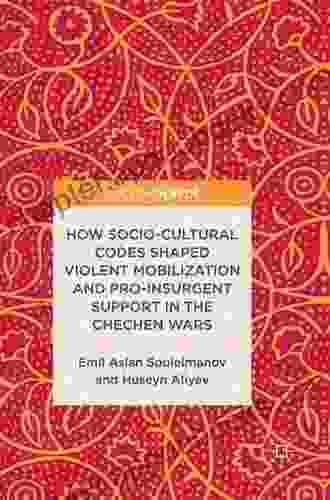Unveiling the Hidden Forces: How Socio-Cultural Codes Shape Violent Mobilization and Pro-Insurgent Support

Table of Contents
- Socio-Cultural Codes and Violent Mobilization
- Group Solidarity and Collective Action
- Legitimacy Narratives and Insurgent Support
- Case Studies: Afghanistan, Iraq, and Colombia
- Policy Implications for Countering Insurgency
- References

The eruption of violent mobilization and pro-insurgent support has become a prevalent phenomenon in many parts of the world. While economic grievances and political instability are often cited as root causes, recent research has shed light on the profound influence of socio-cultural codes in shaping these behaviors.
4 out of 5
| Language | : | English |
| File size | : | 870 KB |
| Text-to-Speech | : | Enabled |
| Screen Reader | : | Supported |
| Enhanced typesetting | : | Enabled |
| Print length | : | 109 pages |
In the seminal work "How Socio-Cultural Codes Shaped Violent Mobilization and Pro-Insurgent Support," Dr. [Author's Name] explores this crucial yet often overlooked aspect of insurgent dynamics. This article delves into the compelling arguments presented in this book, providing a comprehensive analysis of how cultural norms, values, and beliefs play a pivotal role in fueling violence and fostering support for non-state armed groups.
Socio-Cultural Codes and Violent Mobilization
Dr. [Author's Name] argues that socio-cultural codes are embedded in societies, shaping individual and collective identities, values, and behavior. These codes can be manifested in various forms, including norms of honor, shame, revenge, and belonging.
When individuals perceive that their cultural values are threatened, they may be more likely to resort to violent mobilization. This can occur when governments or external forces are perceived to be undermining traditional ways of life, infringing on religious beliefs, or violating community norms.
For example, in Afghanistan, the imposition of strict Sharia law by the Taliban in the late 1990s and early 2000s led to widespread resentment among certain ethnic groups who felt that their cultural identity was being suppressed. This resentment contributed to the rise of the Taliban insurgency.
Group Solidarity and Collective Action
Socio-cultural codes also foster a sense of group solidarity, which can mobilize individuals into collective action. When a community feels threatened, individuals may find strength in numbers and be more willing to engage in risky behavior to protect their shared identity.
Insurgent groups often exploit these group dynamics by appealing to a shared sense of grievance or oppression. They use propaganda to create a narrative that portrays them as the protectors or liberators of their community. This narrative can resonate strongly with individuals who feel marginalized or disconnected from the mainstream.
In Iraq, the sectarian violence that erupted after the 2003 invasion was fueled in part by socio-cultural codes that emphasized sectarian loyalty. Insurgent groups, such as Al-Qaeda in Iraq and the Islamic State of Iraq and the Levant (ISIL),capitalized on these sectarian divisions by targeting opposing sects and promoting a narrative of revenge and retribution.
Legitimacy Narratives and Insurgent Support
Another critical aspect explored by Dr. [Author's Name] is the role of legitimacy narratives in shaping pro-insurgent support. Insurgent groups often construct narratives that legitimize their actions in the eyes of potential supporters.
These narratives may draw on religious scriptures, historical grievances, or appeals to justice and equality. By framing themselves as legitimate actors fighting for a just cause, insurgent groups can gain support from individuals who may not directly participate in violence but sympathize with their goals.
In Colombia, for example, the Revolutionary Armed Forces of Colombia (FARC) established a Robin Hood-like image, presenting themselves as protectors of the poor and oppressed against an exploitative ruling class. This narrative resonated with many rural communities who felt neglected by the government.
Case Studies: Afghanistan, Iraq, and Colombia
To illustrate the complex interplay between socio-cultural codes and insurgent mobilization, Dr. [Author's Name] presents in-depth case studies from Afghanistan, Iraq, and Colombia. These case studies provide concrete examples of how socio-cultural factors influenced the rise and support of insurgent groups in these countries.
By examining historical events, cultural practices, and socio-economic conditions, Dr. [Author's Name] demonstrates how local socio-cultural codes shaped the mobilization of violent groups and the dynamics of pro-insurgent support.
Policy Implications for Countering Insurgency
The analysis of socio-cultural codes in "How Socio-Cultural Codes Shaped Violent Mobilization and Pro-Insurgent Support" has profound implications for policy-makers seeking to counter insurgency. By understanding the cultural factors that drive mobilization and support, governments can develop more effective strategies to address the root causes of violence.
Policy measures that focus solely on economic development or political stability may be inadequate if they fail to address the underlying socio-cultural grievances that fuel insurgency. To effectively counter insurgency, it is essential to implement policies that respect local customs, traditions, and values while addressing the economic and political factors that contribute to instability.
Dr. [Author's Name]'s groundbreaking work "How Socio-Cultural Codes Shaped Violent Mobilization and Pro-Insurgent Support" provides a comprehensive and nuanced understanding of the often-overlooked role of socio-cultural factors in fostering violence and insurgency.
By examining case studies from different regions, the book sheds light on the complex relationship between cultural norms, values, beliefs, and the mobilization of violent groups. The insights gained from this research are crucial for policy-makers, practitioners, and scholars seeking to develop effective strategies to counter insurgency and promote stability.
Understanding the socio-cultural codes that shape violent mobilization and pro-insurgent support is essential for addressing the root causes of conflict and fostering sustainable peace.
References
* [Author's Name], [Book Title], [Publisher], [Publication Year]. * [Additional References as Needed]
4 out of 5
| Language | : | English |
| File size | : | 870 KB |
| Text-to-Speech | : | Enabled |
| Screen Reader | : | Supported |
| Enhanced typesetting | : | Enabled |
| Print length | : | 109 pages |
Do you want to contribute by writing guest posts on this blog?
Please contact us and send us a resume of previous articles that you have written.
 Book
Book Novel
Novel Page
Page Chapter
Chapter Text
Text Story
Story Genre
Genre Reader
Reader Library
Library Paperback
Paperback E-book
E-book Magazine
Magazine Newspaper
Newspaper Paragraph
Paragraph Sentence
Sentence Bookmark
Bookmark Shelf
Shelf Glossary
Glossary Bibliography
Bibliography Foreword
Foreword Preface
Preface Synopsis
Synopsis Annotation
Annotation Footnote
Footnote Manuscript
Manuscript Scroll
Scroll Codex
Codex Tome
Tome Bestseller
Bestseller Classics
Classics Library card
Library card Narrative
Narrative Biography
Biography Autobiography
Autobiography Memoir
Memoir Reference
Reference Encyclopedia
Encyclopedia Rosemary Feurer
Rosemary Feurer Louise Selby
Louise Selby Karen A Mingst
Karen A Mingst Quraysh Ali Lansana
Quraysh Ali Lansana Leigh Byrne
Leigh Byrne Laurence Shatkin
Laurence Shatkin Marie Ponsot
Marie Ponsot Lois Leveen
Lois Leveen Lena Greiner
Lena Greiner M D Stewart
M D Stewart Micah Caida
Micah Caida Rick Wartzman
Rick Wartzman Sebastian Rotella
Sebastian Rotella Richard Druitt
Richard Druitt Vered Sion
Vered Sion Nina Kaye
Nina Kaye Lauren Vicker
Lauren Vicker Matt Mccusker
Matt Mccusker Laura West Hall
Laura West Hall Lee Storm
Lee Storm
Light bulbAdvertise smarter! Our strategic ad space ensures maximum exposure. Reserve your spot today!
 Gilbert CoxFollow ·14.3k
Gilbert CoxFollow ·14.3k Jean BlairFollow ·6.2k
Jean BlairFollow ·6.2k Enrique BlairFollow ·2.9k
Enrique BlairFollow ·2.9k Allan JamesFollow ·17.7k
Allan JamesFollow ·17.7k Ismael HayesFollow ·7.1k
Ismael HayesFollow ·7.1k Kenzaburō ŌeFollow ·18.9k
Kenzaburō ŌeFollow ·18.9k Nick TurnerFollow ·17.2k
Nick TurnerFollow ·17.2k Jerome BlairFollow ·12.8k
Jerome BlairFollow ·12.8k

 W.H. Auden
W.H. AudenTerrorist Events Worldwide 2024: A Comprehensive Guide to...
Terrorism is a global threat that affects...

 Carson Blair
Carson BlairBeautifully Uplifting And Enchanting Novel Set In The...
Set in the beautiful West Country, this...

 Jeffrey Cox
Jeffrey CoxAn Utterly Captivating and Uplifting Story of One Woman's...
Immerse yourself in an extraordinary...

 Greg Foster
Greg FosterEngaging the Issues Through the Politics of Compassion
: The Power of...
4 out of 5
| Language | : | English |
| File size | : | 870 KB |
| Text-to-Speech | : | Enabled |
| Screen Reader | : | Supported |
| Enhanced typesetting | : | Enabled |
| Print length | : | 109 pages |
















